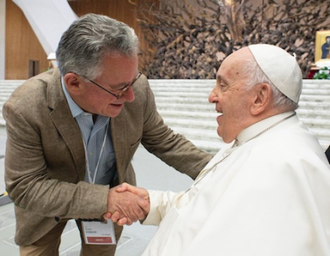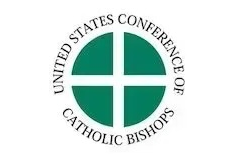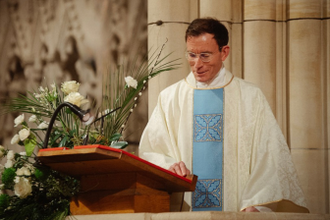'A Celebration of Laudato Si' - Austen Ivereigh talks to J&P campaigners

Austen Ivereigh with Pope Francis - Image; Osservatore Romano.
Northern and Southern Dioceses Environmental Networks organised an online evening event on 4 June marking the tenth anniversary of the 2015 environmental encyclical, Laudato Si'. Around 100 environmental campaigners attended from dioceses around England - including Brentwood, Birmingham, Clifton, Hallam, Lancaster, Leeds, Middlesbrough, Northampton, Salford, Southwark, Westminster - and organisations/groups - including National Justice and Peace Network, Laudato Si Animators, Christian Climate Action, Columban Justice, Peace and Ecology, Jesuit Missions, Medical Mission Sisters and The Society of the Child Jesus.
The two networks work together, "to animate the Catholic community in the long-term task of stabilising our climate and protecting our common home." The event was run by Mark Wiggin of Salford and Colette Joyce of Westminster.
The keynote speaker was Dr Austen Ivereigh, a British writer, journalist, and commentator. He is author of two biographies of Pope Francis: 'The Great Reformer' (2014) and 'Wounded Shepherd' (2019). In 2020 he collaborated with Pope Francis on the Pope's vision for a post-Covid world: 'Let Us Dream: The Path to a Better Future.' Last year he published 'First Belong to God: On Retreat with Pope Francis' (2024), an eight-day spiritual guide to the pontificate, with a foreword by Pope Francis.
In his talk, Austen described Laudato Si' as a "ground-breaking encyclical", the most consequential papal social teaching since Rerum Novarum in 1891, adding that "it built new bridges with science", "captured the imagination of the world", and in the Church "opened up new apostolates." However, there is frustration that the diminishing of "our common home" continues, with mounting global warming, species decline and "too little urgency in our Church" to respond.
Austen asked how often participants had heard about Laudato Si' in their parishes. And, even if there was mention, was there a sense of urgency? In the Church, environmental issues are often "an extra curricular rather than a central concern," suggested Austen. He felt that with the apostolic exhortation Laudato Deum (2023) one "could sense the frustration of Pope Francis," both with the failure of political leaders to act as they had promised, and with those in the Church who continue to deny the evidence of climate change.
So, how does our faith help us to interpret the crises facing our world?
Drawing on a 2000 speech by the then Archbishop of Buenos Aires, Austen said Cardinal Bergoglio distinguished between two "sterile" stances on the one hand, and the Christian "way of discernment" on the other. The first sterile stance was a "naïve optimism" that somehow there will be a technical fix. It was a stance that rejected the need for repentance and put faith in progress. The other was "apocalyptic pessimism" which foresaw only doom, and humanity as intrinsically opposed to nature. Bergoglio pointed out that both stances deny agency, both God's and humanity's.
The way of discernment, on the other hand, takes into account the horizon changed by the Incarnation, the Cross and above all the Resurrection, in which history has an end and a meaning against which all developments can be measured. The arc of history is bent towards communion - a future of fraternity, justice and peace - by God's spirit acting in human hearts. The way of discernment allows us to glimpse this arc and to cooperate with it.
Austen then spoke of the method that Pope Francis used to enter into this way of discernment, using a broad SEE-JUDGE-ACT model. The first stage was to enter the crisis and open our eyes to places where there is pain and suffering. What is happening to our Earth? The second task is discernment: finding where God's action can be seen and what frustrates God's action. The third was to move to proposals for action in line with the Kingdom, confident that what is aligned with the arc of the Kingdom is never wasted.
He suggested that the Laudato Si apostolate can be considered as enabling these three tasks: (a) helping people to see what is happening to our Earth and to help people experience grief and the desire to repent; (b) helping people enter into an understanding of what is happening (as does Laudato Si in chapters three and four); and (c) enabling processes of synodal discernment that move through these two stages into concrete actions.
Finally, Austen reflected on the virtues of humility and patience, "a confident expectation in God's action in spite of the apparent evidence that the powers of this Earth have triumphed". Hope is what creates the space for God's action.
For example, it was clear that through the suffering of the natural world at this time there was a growing awareness of the agency of creatures. The signs of hope were in projects and activities that showed how "creaturely life can come back in abundance where humans not just restrain their own destructive, extractive practices, but when they create space for other creatures to recover co-agency with humans." Such a "vision of partnership of humans and non-human creatures that is clearly part of the divine plan."
In group discussion, people talked about support for the Laudato Si Platform, the networking of Laudato Si' animators both inside and outside the Church, CAFOD'S Livesimply Award and preparing for the Season of Creation in the Autumn. They felt stories about these should appear more regularly in the media. Hopes over the next 10 years included that projects inspired by Laudato Si' would increase and flourish. Learning to live with less will be a priority and transformation in the direction of sustainable lifestyles. There was commitment to the 9 July mass lobby of Parliament, asking MPs to take action on climate, debt and nature.
In the final Plenary, looking at hopes for the next few years, Austen flagged up that the Church is working towards an ethical framework for Artificial Intelligence, and this was likely to be core to Leo XIV's social teaching. He said Francis feared "the fading of human faces" as people began treating AI as an idol. He also highlighted the commitment of Pope Francis and now Pope Leo to peacebuilding. Within the last few days Pope Leo has mentioned the Church's nonviolence initiative.
Austen reminded the gathering that Leo XIII's Rerum Novarum took decades to be received and become central to the Church's teaching, and that the integral ecology of Laudato Si, too, will take time to enter into the mainstream of theology and formation. But it has begun, and will continue.
LINKS
Westminster J&P southern network: https://westminsterjusticeandpeace.org/southern-dioceses-environment-network/
Northern dioceses environment group: www.eventbrite.co.uk/o/ndeg-northern-dioceses-environment-group-95263830333
Vatican document on AI: www.vatican.va/roman_curia/congregations/cfaith/documents/rc_ddf_doc_20250128_antiqua-et-nova_en.html

















